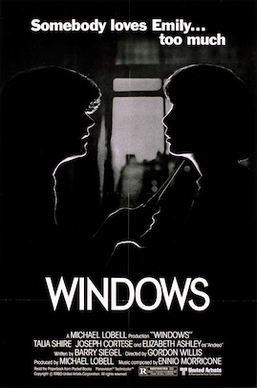Top Qs
Timeline
Chat
Perspective
Windows (film)
1980 film by Gordon Willis From Wikipedia, the free encyclopedia
Remove ads
Windows is a 1980 American psychological thriller film directed by Gordon Willis and starring Talia Shire, Joseph Cortese, and Elizabeth Ashley.[2] It was the only film directed by Willis, who was better known as a cinematographer for such films as The Godfather series and several films by Woody Allen.[3]
Remove ads
Plot
Summarize
Perspective
Emily Hollander is the subject of a lesbian obsession of Andrea Glassen, her next-door neighbor. A shy, recently divorced woman, Emily lives alone in a Brooklyn Heights apartment. One night, a man forces his way into her apartment and performs a bizarre assault on her: He forces her to make sounds of erotic satisfaction, capturing them on his tape recorder. She reports the attack to the police, and while they are interviewing her, Andrea stops by to comfort her.
Emily seeks safety by moving to an apartment in Manhattan. However, while she is moving out, the same man tries to attack her again. This time, Andrea just happens to be visiting Emily, and she is able to prevent the man from entering Emily's apartment.
It soon becomes apparent that Andrea is not the helpful neighbor that she seems: she hired a taxi driver to perform the attacks, with the purpose of gaining the recording, to which she repeatedly listens to and eventually recites while fantasizing of Emily. Andrea has fallen in love with Emily and her plan is that Emily will decide to live with her out of fear and a need for security and comfort in the wake of the attacks, and that Emily will end up reciprocating Andrea's love given time and closeness. Unaware of the situation, Emily continues to view Andrea as a friend. She also begins a relationship with the police detective who responded to her case. At this intrusion into her fantasy, Andrea becomes increasingly unhinged, and takes to spying on Emily through a telescope.
When Emily unwittingly hails a taxi driven by the very man who assaulted her, he strikes up a conversation "because you look familiar." She finally realizes who the man is and asks him to stop at a phone booth. She calls the police, who advise her to get back into the taxi and engage the man in harmless conversation until they can arrive to assist her.
With the taxi driver getting arrested and confessing to the entire plot, Emily and Andrea have a confrontation. Andrea professes her love for Emily, but Emily slaps her hard on the face and tells a devastated, weeping Andrea that they never will speak to each other again. Her ordeal over, Emily greets the detective at her front door.
Remove ads
Cast
- Talia Shire as Emily Hollander
- Joe Cortese as Bob Luffrono (as Joseph Cortese)
- Elizabeth Ashley as Andrea Glassen
- Kay Medford as Ida Marx
- Michael Gorrin as Sam Marx
- Russell Horton as Steven Hollander
- Michael Lipton as Dr. Marin
- Rick Petrucelli as Lawrence Obecny
- Ron Ryan as Detective Swid
- Linda Gillen as Police Woman
- Tony DiBenedetto as Nick
- Bryce Bond as Voice Over
- Ken Chapin as Renting Agent
- Marty Greene as Ira
- William Handy as Desk Officer (as Bill Handy)
- Robert Hodge as Desk Sergeant
- Kyle Scott Jackson as Detective
- Pat McNamara as Doorman
- Gerry Vichi as Ben
- Oliver as Jennifer the Cat
Remove ads
Release
Summarize
Perspective
Box office
United Artists released Windows theatrically in the United States on January 18, 1980.[1] It earned $311,796 during its opening weekend, and went on to gross a total of $2,128,395 internationally.[1]
Controversy
The film was the subject of many protests from gay rights activists who accused the film of being homophobic and resorting to hateful stereotypes of lesbians.[4]
David Denby attacked the film, writing "Windows exists only in the perverted fantasies of men who hate lesbians so much they will concoct any idiocy in order to slander them."[5]
Critical response
Gene Siskel and Roger Ebert both gave negative reviews for the film alongside other critics like Vincent Canby for The New York Times.[6][7][8][9][10]
Charles Champlin of the Los Angeles Times praised it as "unmistakably a cinematographer's film, a succession of images that are technically remarkable and beautiful to see, marvelous plays of light and shadow," but felt the screenplay lacked depth, specifically in regard to the psyche of Ashley's character, rendering the villain lacking in credibility.[11]
Accolades
Home media
MGM Home Entertainment released a made-on-demand DVD edition through their Limited Edition Collection line on June 28, 2012.[14] Scream Factory released the film on Blu-ray July 4, 2017 with a high-definition transfer from the interpositive and interviews with both actresses and producer along with trailer and TV spots.[15] The Blu-ray went out of print on June 4, 2022.[15]
Novelization
The novelization of Windows was written by H. B. Gilmour.[16] It was published by Pocket Books in 1980.[17]
Remove ads
Legacy
Gordon Willis admitted the film had been a mistake,[18][19] and later said of directing that he did not like it. "I've had a good relationship with actors," he reflected, "but I can do what I do and back off. I don't want that much romancing. I don't want them to call me up at two in the morning saying 'I don't know who I am'".[20]
See also
- List of American films of 1980
- List of horror films of 1980
- Cruising, another 1980 film accused of being homophobic only to be reevaluated as an LGBT classic
References
Sources
Further reading
External links
Wikiwand - on
Seamless Wikipedia browsing. On steroids.
Remove ads

